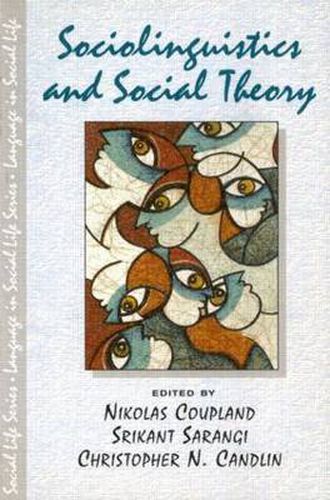Readings Newsletter
Become a Readings Member to make your shopping experience even easier.
Sign in or sign up for free!
You’re not far away from qualifying for FREE standard shipping within Australia
You’ve qualified for FREE standard shipping within Australia
The cart is loading…






The empirical and descriptive strengths of sociolinguistics, developed over more than 40 years of research, have not been matched by an active engagement with theory. Yet, over this time, social theorising has taken important new turns, linked in many ways to linguistic and discursive concerns. Sociolinguistics and Social Theory is the first book to explore the interface between sociolinguistic analysis and modern social theory. Nikolas Coupland is Professor and Director of the Centre for Language and Communication Research, Cardiff University. Srikant Sarangi is Reader in Language and Communication at the Centre for Language and Communication Research, Cardiff University, and Christopher N. Candlin is Chair Professor of Applied Linguistics and Director of the Centre for English Language Education and Communication Research, City University of Hong Kong. The book sets out to reunite sociolinguistics with the concepts and perspectives of several of the most influential modern theorists of society and social action, including Bakhtin, Foucault, Habermas, Sacks, Goffman, Bourdieu and Giddens. In eleven newly commissioned chapters, leading sociolinguists reappraise the theoretical framing of their research, reaching out beyond conventional limits. The authors propose significant new orientations to key sociolinguistic themes, including: - social motivations for language variation and change- language, power and authority- language and ageing- language, race and class- language planningIn substantial introductory and concluding chapters, the editors and invited discussants reassess the boundaries of sociolinguistic theory and the priorities of sociolinguistic methods. Sociolinguistics and Social Theory encourages students and researchers of sociolinguistics to be more reflexively aware and critical of the social bases of their analyses and invites a reasessment of the place sociolinguistics occupies in the social sciences generally.
$9.00 standard shipping within Australia
FREE standard shipping within Australia for orders over $100.00
Express & International shipping calculated at checkout
The empirical and descriptive strengths of sociolinguistics, developed over more than 40 years of research, have not been matched by an active engagement with theory. Yet, over this time, social theorising has taken important new turns, linked in many ways to linguistic and discursive concerns. Sociolinguistics and Social Theory is the first book to explore the interface between sociolinguistic analysis and modern social theory. Nikolas Coupland is Professor and Director of the Centre for Language and Communication Research, Cardiff University. Srikant Sarangi is Reader in Language and Communication at the Centre for Language and Communication Research, Cardiff University, and Christopher N. Candlin is Chair Professor of Applied Linguistics and Director of the Centre for English Language Education and Communication Research, City University of Hong Kong. The book sets out to reunite sociolinguistics with the concepts and perspectives of several of the most influential modern theorists of society and social action, including Bakhtin, Foucault, Habermas, Sacks, Goffman, Bourdieu and Giddens. In eleven newly commissioned chapters, leading sociolinguists reappraise the theoretical framing of their research, reaching out beyond conventional limits. The authors propose significant new orientations to key sociolinguistic themes, including: - social motivations for language variation and change- language, power and authority- language and ageing- language, race and class- language planningIn substantial introductory and concluding chapters, the editors and invited discussants reassess the boundaries of sociolinguistic theory and the priorities of sociolinguistic methods. Sociolinguistics and Social Theory encourages students and researchers of sociolinguistics to be more reflexively aware and critical of the social bases of their analyses and invites a reasessment of the place sociolinguistics occupies in the social sciences generally.